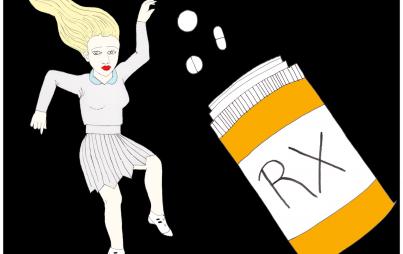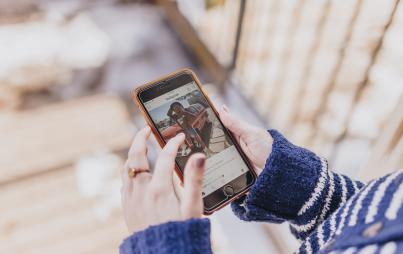
A person recovering from addiction can choose — difficult and brave as it may be — to stay away from situations where the substance(s) with which they struggle is present. People with eating disorders? Not so much.
I’ll be honest: There have been so many times in my life when someone has said something to me so absurd or asinine that the only thought floating through my brain was, “I wish they knew better.”
But what can I expect, really?
It’s unfair to think that every person walking about this earth should prioritize reading up on eating disorders so that they can become mini-experts, just in case they end up coming into contact with me later in life. That’s ridiculous.
But I know that so many of you have been in this awkward position, too.
So here’s a short list of five things I wish people knew before interacting with me on the axis of concern and support. And if you wanted to print this out into flyers to hand out to your loved ones, I wouldn’t blame you.
1. It’s Not a Choice — Or a Diet
I’m a vegetarian. I’ve been a vegetarian for 11 years now, but my father still struggles with this concept. Whenever I come home, he’ll put things like bacon on my plate and then throw up his arms in surrender when I remind him that I can’t eat it.
“If you want to lose weight,” he’ll tell me, “why don’t you go on an easier diet?”
To start, vegetarianism isn’t difficult, so I don’t know what he’s talking about when he says “easier.” But also, my vegetarianism isn’t a diet. It isn’t something that I’m doing to “lose weight and feel great.” It’s simply the way that I choose to eat.
An eating disorder, however, is not a choice — although it also isn’t a diet.
Because diet culture is so ingrained in our society, and therefore our psyches, a common misconception about eating disorders — and particularly those of the restricting and purging varieties — is that they’re choices that people make with the end goal of losing weight.
And this actually normalizes eating disordered behavior because it comes off as simply an extreme of what we’re taught are “normal” eating cycles in our culture.
But let me be clear: We do not choose eating disorders, even if we did choose initially to go on a diet (which is how a lot of eating disorders start). Rather, eating disorders choose us.
And that’s actually one of the scariest parts — that we had no choice in this horror.
2. We Can’t “Just Eat”
Because people are convinced that eating disorders are choices that we actively make, they also tend to think that we can just shed them whenever we feel like it. “Don’t want to wear shorts today? Just wear pants! Don’t want to starve yourself today? Just eat!”
But we can’t “just eat” — or “just stop purging” or “just stop overeating.” That’s the entire point.
If we could have escaped this madness at any moment by simply deciding to think and behave differently, trust me: We would have a long, long time ago.
Eating disorders are predicated on obsessions and compulsions. They’re the effects of brain chemistry gone awry. They happen because our understandings of food and our bodies are twisted.
And there isn’t a magical simple solution for that, unfortunately.
3. It’s Inescapable
Sometimes, eating disorders are likened to addictions, particularly in this manner: A person recovering from addiction can choose — difficult and brave as it may be — to stay away from situations where the substance(s) with which they struggle is present. People with eating disorders? Not so much.
There are a few things that we can’t escape in life. Death and taxes, yes. But also, among other things: the stuff that keeps us alive (like food) and the vehicle that carries us through life (our bodies).
Every single day, a person with an eating disorder (or a person in recovery) wakes up and has to face their body and the fact that they need to eat. We are constantly — all day, every day — forced to be face-to-face with the exact two things that give us the most anxiety.
And in a society that also constantly bombards us with messages about beauty and diets?
We can’t get away from it.
So forgive us if sometimes it feels like too much to bear, and we’re just stressed out.
4. It Sucks
The media does a lot to glamorize eating disorders, especially restrictive ones, and our effed-up culture continually congratulates us for our dedication to what we’ve mistakenly come to understand as willpower. But the truth of the matter is that having an eating disorder sucks.
When you’re in the midst of it, it feels like it’s really important and necessary. It melts into you, becomes a part of you somehow. Sometimes you’re not sure how you could ever live without it, since you lean on it so heavily as a coping mechanism and a distraction. It often feels like something worth holding onto because it’s so hard to imagine an existence without it.
But once it’s gone, you realize how horrendous it was; how hurtful, how painful. Even when you’re caught up in it, you know — you just don’t want to admit it to yourself because you feel like all of the aforementioned supposed pros are worth the silly little con of it's ruining your life.
Know that this isn’t something that any person in their right mind would choose or want. Know that, eventually, we’ll want to find a way out of this hell, even if we’re screaming and scratching our way out.
Understand that it just might take us some time to figure that out — and that some of us never will.
5. We Need You
No one wants to admit this. In a culture that so highly values self-sufficiency, no one ever wants to admit when they need help. Hell, I won’t even ask for assistance finding something in a store when I’m low on time — I need to figure it out myself. Never mind asking for directions (praise be to Google Maps and smartphones).
But someone with an eating disorder — an issue with food and our bodies that is centered on the notion of what self-control does and does not mean for us? Damnit, we don’t want your help. We want to be left alone, either to wallow in the pain of it or to heal on our own.
But listen: It’s a front. We may not even realize at the time that it’s a front, but it’s a front.
We do need you.
We need you to be there for us when we’re crying because we can’t for the life of us see the beauty in the mirror. We need you to be understanding when the thought of meeting up for dinner or going shopping for swimsuits at the mall terrifies us. We need you to forgive us if we cancel on you suddenly in a panic. We need you, when we’re inching toward recovery, to remind us that there’s nothing scary about a slice of pizza.
We need you to listen, to nod, to tell us that you might not fully understand, but that you want to support us in any way you can. We need you to give us resources, but not shove them in our faces — to allow us to get better on our own time. We need you to take drastic measures when we’re so far out of control that you’re scared for us.
We need you to love us, even when we’re pushing you away.
And we need you to hold us because there’s nothing else keeping us together.
And mostly, rather than spouting off misconceptions that could hurt us deeper in the end, we need you just to ask, “What can I do for you right now?”
And that could make all the difference.








